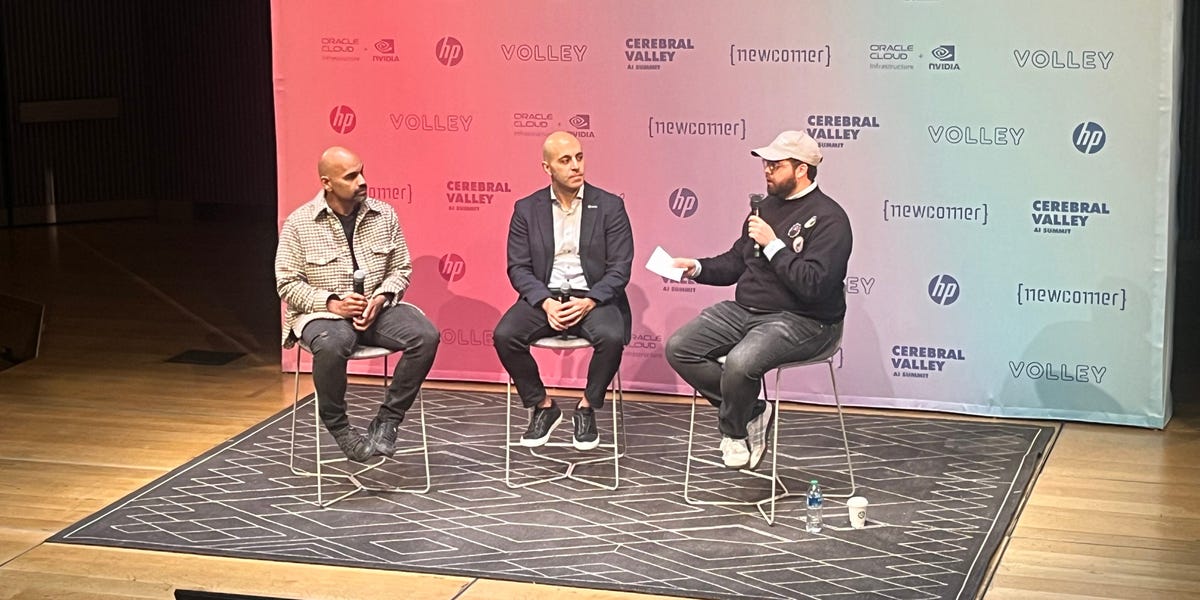More than 300 AI founders and investors gathered earlier this week in San Francisco’s Hayes Valley neighborhood for the 2nd Cerebral Valley AI Summit, co-hosted by the independent journalist Eric Newcomer and AI gaming startup Volley.
Though less than two miles from OpenAI’s flashy new headquarters, the company—who put generative AI on the map last year with the launch of ChatGPT—was not represented at the conference. Even still, OpenAI was present in nearly every conversation, whether on stage or on the sidelines.
“The game now is just trying to find something that OpenAI won’t build,” said Alex Pall, a founder of Mantis Venture Capital and member of musical group The Chainsmokers.
At its first ever developer day earlier this month, OpenAI announced a slew of new updates including a more powerful foundational model, a new, cheaper pricing structure, and expanded tools for creating custom chat bots. Some called it an “extinction event for other AI startups.” That’s left many founders in the space scrambling to explain how they’re different from OpenAI.
“Everyone’s trying to find their niche vertical, now that OpenAI said they’re basically gonna do everything,” said Andrew Hoh, a co-founder of AI tooling company LastMileAI.
Veteran investor Reid Hoffman, speaking to Newcomer, said that companies need to have a vision that isn’t dependent on OpenAI or any other tech giant.
“If what your sort of plan was, I’m going to be a thin wrapper on top of a company’s API, that’s a dangerous place,” Hoffman said.
Fellow investor Vinod Khosla put things a bit more bluntly during his talk: “The question for all of you is which startups become roadkill,” he said. Khosla was an early backer of OpenAI, investing $50 million into the company in 2019.
Jason Warner, who led the creation of GitHub’s AI code-writing bot Copilot and is now CEO of AI startup Poolside, says that OpenAI’s $10 billion investment from Microsoft has allowed the company to lay claim to many essential resources, be it high-end graphics chips or scarce AI talent.
“OpenAI can bully everyone, they can bully the talent, they can bully the competition, they can bully the term sheets. I don’t say that as a bad thing, if you have the war chest, why wouldn’t you use it,” Warner said.
He says it’s been a challenge to hire top tier AI research talent when his company can’t afford to pay what OpenAI or Anthropic can pay. He’s had at least four potential candidates turn him down outright, and he says his team conducted more than 400 interviews in order to hire 10 employees.
Even still, he’s not discouraged. He says Poolside is “zigging where they are zagging.” That strategy includes relocating the company’s headquarters to Paris, which Warner says has an untapped pool of high quality AI talent, and going after use cases and customers where OpenAI is less well positioned.
“When you step on the court with Jordan, you don’t try to beat him at his game. We’re playing a different game,” he said.
During his panel, Warner was asked about those who took to social network X, formerly Twitter, to proclaim the death of nascent AI startups. He had a defiant answer.
“Honestly, that Twitter stuff, that’s for VCs, because who the fuck cares what they say anyway?” he said.
Read the full article here





